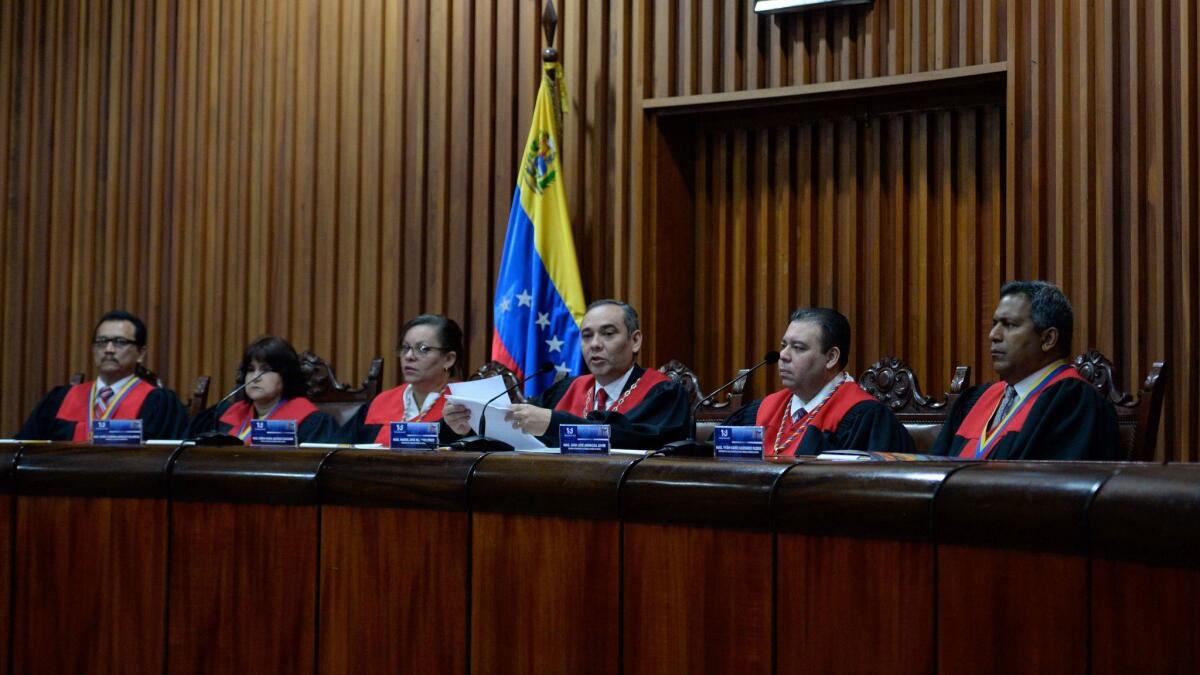Venezuela’s opposition emboldened after top court reverses decision to strip congress’ power

- Share via
Reporting from CARACAS, Venezuela — Venezuela’s beleaguered opposition emerged with a rare political victory Saturday as the nation’s Supreme Court reversed a pair of decisions that had sparked domestic and international condemnation against the government of President Nicolas Maduro.
The high court’s sudden turnaround seemed to defuse the latest political crisis to shake the South American nation. But the protracted battle between the opposition and the Maduro government showed no signs of ebbing, and may intensify in coming days.
Maduro’s administration initially defended the extraordinary rulings that had stripped the opposition-led National Assembly of its duties and enhanced the power of the beleaguered president.
But late Friday, after an emergency meeting with his his security staff, Maduro appeared on television and asked the court to review its decisions. The president pronounced the issue resolved and invited his opponents to sit down in talks.
“I insist that the Venezuelan opposition return to the road of dialogue, return to the road of sovereignty,” Maduro said.
But emboldened opposition leaders said there would be no dialogue until the government met some of their longtime demands, such as moving forward presidential elections scheduled for next year.
“The only possible dialogue is the vote,” declared Julio Borges, president of the National Assembly, or congress.
Maduro’s opponents said they would proceed this week with an effort to remove members of the Supreme Court, a pro-Maduro body that has consistently blocked congressional measures. That effort seemed certain to ignite more political fireworks.
While calling for dialogue, Maduro also returned to his frequent assertion that Venezuela is the victim of “dark” forces orchestrated from the United States, longtime adversary of the socialist leadership in Caracas.
The grave situation that faces Venezuela continues! There is nothing to clarify with respect to the constitution!
— Henrique Capriles, opposition leader and former presidential candidate
“Venezuela is experiencing a political lynching,” Maduro said on television. “It is a brutal assault by very dark forces who want to take over our homeland.”
The Venezuelan opposition, long fractured and dispirited, seemed encouraged after a rare victory against Maduro. Whether that means the opposition is coming closer to achieving longer-term goals remains in question, however.
“The grave situation that faces Venezuela continues!” Henrique Capriles, former presidential contender and opposition leader, said in a Twitter message from Washington, where he was visiting. “There is nothing to clarify with respect to the constitution!”
He and other opposition leaders repeated a series of demands, including the holding of early elections, the release of what they call political prisoners and an end to “persecution” of opposition figures.
On Saturday, the opposition conducted a rally in Caracas, the capital, beneath an unforgiving sun. Many carried Venezuelan flags and placards with slogans such as, “No to dictatorship” and “Out with Maduro.”
National Guard forces used tear gas to scatter an opposition group advancing in the capital.
The Supreme Court, which earlier in the week issued a pair of rulings that essentially stripped the nation’s legislative branch of its powers, issued several clarifications Saturday on its website. The revised language reversed the earlier, controversial rulings labeling the National Assembly in “contempt” of the law.
Those rulings were met with censure from both international and domestic critics. Some labeled the court’s action a coup d’etat.
Even the nation’s attorney general, Luisa Ortega Diaz, considered a Maduro loyalist, called the rulings a “rupture” of the constitutional order, a comment that signaled deep divisions within the ruling socialist party. Her pointed critique appeared especially damaging to any government effort to justify what many viewed as a Maduro power grab.
The court decisions triggered a new wave of street protests. Maduro’s foes had long assailed the Supreme Court as a tool of Maduro. The magistrates have blocked a succession of congressional measures since the opposition gained control of the National Assembly in 2015.
The opposition’s aim is to end 18 years of socialist rule that critics say has wrecked the economy and left the South American nation a political, economic and social basket case, despite its vast oil reserves and previous status as one of Latin America’s richest nations.
Venezuela has been grappling with a political and economic crisis marked by triple-digit inflation, shortages of food and medicines and rampant street crime. But Maduro’s socialist government has blocked efforts to move up elections scheduled for next year or to convene a referendum on his leadership. The president’s term does not end until 2019.
Maduro, a protege of late President Hugo Chavez, has blamed his country’s woes on a U.S.-engineered “economic war” against Caracas’ leftist policies. Washington has been a longtime critic of the socialist government of Maduro and Chavez, the populist ex-president who was an implacable critic of what he termed U.S. “imperialism.”
Polls indicate that Maduro’s popularity has dropped below 20%.
But the government still enjoys considerable support, especially among poor Venezuelans who have benefited from cheap housing and other aid bestowed by the socialist government. Pro-government activists routinely organize rallies to demonstrate their backing of the Maduro government and loyalty to the socialist legacy of Chavez.
Special correspondent Mogollon reported from Caracas and Times staff writer McDonnell from Mexico City.
Twitter: @mcdneville
ALSO
Venezuela’s top prosecutor rebukes Supreme Court power grab as protests continue
Op-Ed: Venezuela’s raging homicide epidemic is going unrecorded
Venezuela in showdown with OAS, U.S. over political prisoners
UPDATES:
7:55 p.m.: This article was updated with additional quotes from Nicolas Maduro.
4:50 p.m.: This article was updated with additional context and background.
10:30 a.m.: This article was updated with staff reporting including comments from President Nicolas Maduro and confirmation of opposition plans to move forward with protests and of another emerging political crisis in Paraguay.
This article was originally published at 7:35 a.m.
More to Read
Sign up for Essential California
The most important California stories and recommendations in your inbox every morning.
You may occasionally receive promotional content from the Los Angeles Times.










